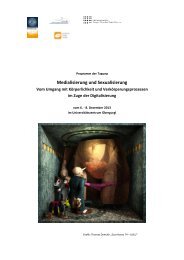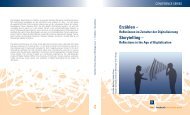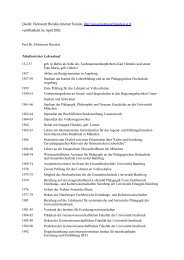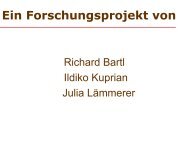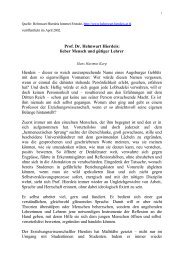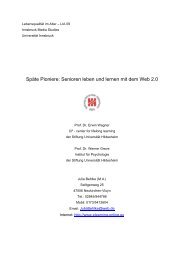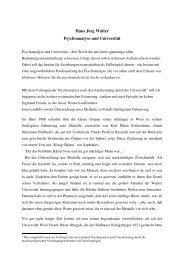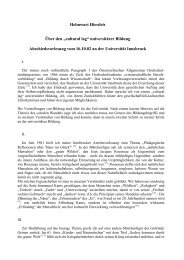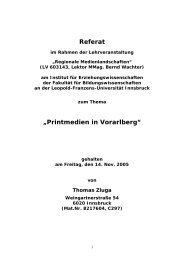Download pdf - Universität Innsbruck
Download pdf - Universität Innsbruck
Download pdf - Universität Innsbruck
Erfolgreiche ePaper selbst erstellen
Machen Sie aus Ihren PDF Publikationen ein blätterbares Flipbook mit unserer einzigartigen Google optimierten e-Paper Software.
76 Manuela Farinosi & Leopoldina Fortunati<br />
versities with which this course collaborates internationally and annually organizes for<br />
moments of debate. In this year, the two workshops were organized firstly by the University<br />
of Erfurt (Germany) and secondly by the Hong Kong Polytechnic University (Hong<br />
Kong). Students were encouraged also to discuss and select among themselves, their representatives<br />
for these two major events. However, the fact that the class was made of two<br />
different parts, one in Pordenone and the other in Udine, and that the distance learning had<br />
severe constraints at the structural level, risked being obstructions to the efficiency of the<br />
learning process and to students’ socialization. To overcome this difficulty, we activated<br />
two social platforms that are becoming increasingly embedded in the daily life of young<br />
people: Facebook and GoogleDocs. Why did we decide to activate Facebook among the<br />
various social networks? – Because, Facebook is the most adopted SNS in Italy. According<br />
to the data provided by Socialbakers.com, there are around 20 million people who use<br />
Facebook in Italy. Facebook penetration in Italy is 35.4%, compared to the country's population,<br />
and 68.5% in relation to the number of Internet users. The largest age group is<br />
made of young people who are currently between 25–34 years old, with a total of<br />
5,350,067 users, followed by the users between the ages of 18–24.<br />
Fig. 1: User age distribution on Facebook in Italy (source: Socialbakers.com)<br />
So, given that Facebook is a social utility used by many young people and our students<br />
spent a significant amount of time interacting on this site, we decided to exploit Zuckerberg’s<br />
platform in order to design an informal venue for students’ learning experience.<br />
These two platforms were chosen with the purpose of creating a place of debate, and for<br />
internal socialization and organization shared by all the students. A Facebook closed<br />
group, called “Theories and techniques of the new media@Uniud” was created in February<br />
2011 in order to encourage students to take part in class-life, to talk to each other, to<br />
have a dialogue with the professors and to share various content with their peers. The<br />
Facebook group was requested by the students themselves in order to discuss questions



